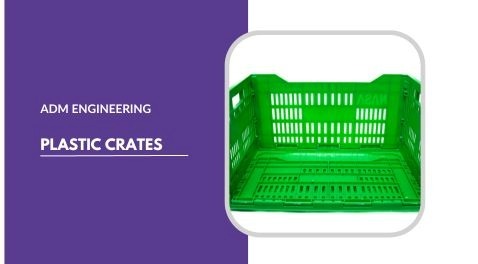
In an era where environmental consciousness is at its peak, industries are fervently seeking sustainable alternatives to conventional materials. The packaging sector, in particular, has witnessed a significant shift towards eco-friendly solutions to address the growing concerns about plastic pollution. Amidst this sustainability revolution, plastic crates have emerged as a notable player, redefining packaging practices with their eco-friendly attributes.
The Rise of Plastic Crates in Packaging
Plastic crates, traditionally associated with storage and transportation, are now making waves as a sustainable packaging solution. Unlike single-use plastics that dominate the packaging landscape, these crates are designed for repeated use, significantly reducing the environmental impact associated with disposable packaging.
Durability and Reusability
One of the key features contributing to the sustainability of plastic crates is their durability. Constructed from robust materials, these crates are designed to withstand the rigors of transportation and storage over an extended period. The longevity of plastic crates allows for repeated use, minimizing the need for constant replacement and reducing the overall demand for new packaging materials.
Reducing Single-Use Plastics
The sustainability of plastic crates lies in their ability to replace single-use plastics. Traditional packaging materials, such as cardboard and Styrofoam, are often used once and then discarded, contributing to the mounting global waste crisis. Plastic crates, on the other hand, provide a reusable alternative that diminishes the reliance on single-use packaging, offering a practical solution to mitigate environmental harm.
Environmental Impact and Life Cycle Assessment
Material Composition
While the term "plastic" may raise concerns about environmental friendliness, the type of plastic used in these crates matters significantly. Many plastic crates are crafted from recyclable materials, and some are even made from recycled plastics. The shift towards using recycled materials not only reduces the demand for new plastic production but also diverts existing plastic from landfills.
Energy Efficiency
A life cycle assessment of plastic crates reveals their energy efficiency compared to alternative materials. The production of plastic crates requires less energy than the manufacturing of certain traditional packaging materials. Additionally, their reusability further enhances their overall energy efficiency, making them a more sustainable choice from a life cycle perspective.
Economic Benefits of Plastic Crates
Cost-Effective Sustainability
Investing in sustainable practices often raises concerns about increased costs. However, plastic crates present a cost-effective solution over the long term. The initial investment in durable crates pays off through their extended lifespan and the reduced need for frequent replacements. Businesses embracing plastic crates not only contribute to environmental well-being but also find economic advantages in the form of reduced packaging expenses.
Supply Chain Efficiency
The use of plastic crates extends beyond sustainability; it also enhances supply chain efficiency. The standardized design of these crates facilitates easy stacking, handling, and transportation. This not only streamlines logistics but also reduces the need for excessive packaging materials, leading to a more efficient and environmentally conscious supply chain.
Challenges and Innovations
Recycling Infrastructure
While plastic crates offer a sustainable alternative, challenges persist in the recycling infrastructure. Proper recycling facilities and systems are crucial to ensure that these crates are effectively recycled at the end of their life cycle. Investments in recycling infrastructure are essential to maximize the environmental benefits of plastic crates.
Innovations in Material Science
Continued research and innovation in material science are driving the development of even more sustainable plastic alternatives. Biodegradable plastics and plant-based materials are emerging as potential successors to conventional plastics, offering the durability of plastic crates with reduced environmental impact.
Conclusion
By adopting plastic crates as a fundamental element of environmentally friendly packaging solutions, ADM Engineering India is making a significant advancement towards sustainability. Remarkable for their strength, affordability, and reusability, these crates offer a strong substitute for traditional single-use plastics. With the world becoming more environmentally conscious, plastic crates become a real and powerful force driving the continuous sustainability revolution in the packaging industry. Plastic crates are positioned to play a major role in reshaping the packaging industry with continuous advancements and solutions to overcoming obstacles.

